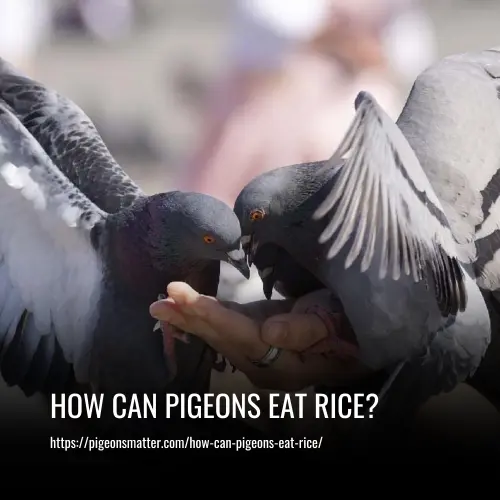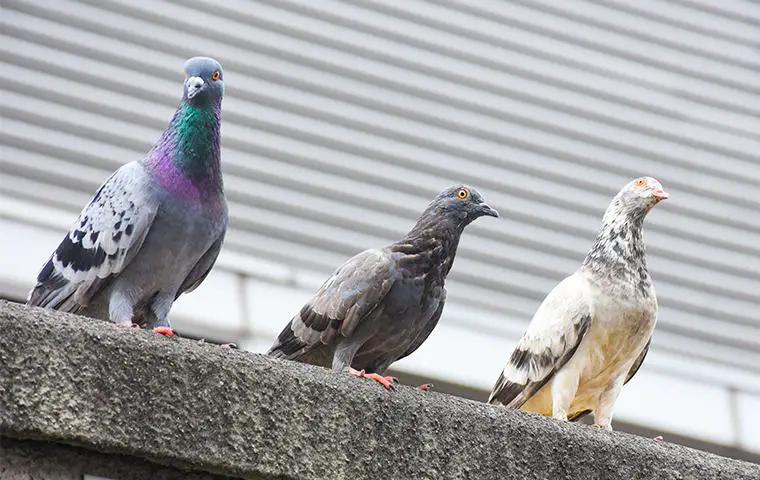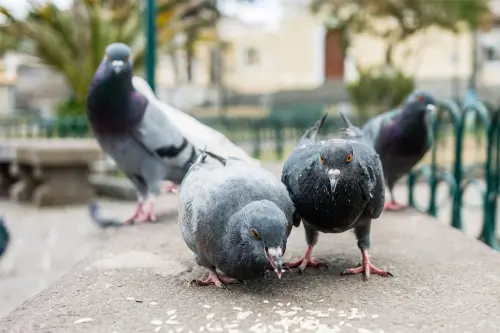How Can Pigeons Eat Rice?
This post contains affiliate links. As an Amazon Associate, we earn from qualifying purchases.
Pigeons can safely eat rice without any negative effects. It is a healthy food for them and there is no evidence to support the myth that rice will expand in their stomach and cause harm. In fact, pigeons and doves can digest rice as a whole grain due to their larger esophagus.

The Suitability Of Rice For Pigeons
Rice can be a suitable food option for pigeons as it is a good source of carbohydrates and energy. It also contains small amounts of protein, fiber, and minerals. However, it should not be fed as a sole diet as pigeons require a balanced diet of seeds, fruits, and vegetables to meet their nutritional needs. Brown rice is a better option than white rice as it has higher nutritional value.
Feeding rice in moderation as a supplement to a balanced diet can provide additional energy and nutrients. However, overfeeding rice can lead to health issues such as obesity and nutritional imbalances. It is important to fully cook and clean the rice to prevent digestive issues. Other grains like wheat, barley, and millet can also be included in a pigeon’s diet.
Do Pigeons Eat Uncooked Rice
Mixing different types of seeds and rice or whole grains is good for pigeons as only giving rice can lead to nutrition deficiency. Uncooked rice has no health hazard to pigeons as their digestive system starts working while food reaches the stomach, breaking down the food.
Uncooked rice will not absorb water into the stomach, as proper heat is needed to change the structure of the starch inside the rice. Without proper heat, the rice will not expand, so feeding uncooked rice will not harm or cause the pigeon to die.
Do Pigeons Eat Cooked Rice
Pigeons can safely eat cooked rice as it is suitable for vegetarian animals and birds. The rice increases in size after cooking, allowing the same amount of uncooked rice to feed two or three pigeons. Cooked rice easily fulfills hunger for a certain period, with no chance of further expansion as it has already absorbed water.
While safe, it should not be given regularly to maintain food interest. Pigeons may even steal rice from paddy fields as it contains no toxic elements. Though uncooked rice may be dry and hard, digestion is not an issue as the stomach contains chemicals to break it down easily.
Do Pigeons Like Rice
Domestic pigeons generally prefer seeds and fruits over rice, which is not their first choice for food. While they will eat rice with interest if given after a long time, it is believed that rice alone cannot satisfy their hunger.
Pigeons who are not accustomed to eating rice and have a diet primarily of grain seeds will likely not eat rice at all. Additionally, if given only rice, pigeons may become hungry quickly due to it not being their preferred food source.
Is Rice Safe For Pigeons
Yes, rice is undoubtedly safe for pigeons. Pigeons can eat both cooked and uncooked rice without any harm. It is a myth that uncooked rice will cause their stomach to explode, as they eat rice during migration and it never harms them.
Feral doves, such as the Rock Dove, which are found in most parks, are known to enjoy eating fruits, nuts, seeds, insects, and small animals, including rice.
Is Rice Harmful To Pigeons
Pigeons can consume up to 50% of their body weight in a day, equating to about 3 to 4 oz. of raw rice per pigeon. While this may not seem like a lot for just one pigeon, considering the large population of pigeons in the US that consume rice regularly, the dangers become more apparent.
Overeating rice can lead to obesity, altered mating habits, or even death in some cases. Additionally, overeating rice can lead to deadly cancer tumors that render pigeons infertile. Therefore, consuming excessive amounts of rice poses significant health risks to pigeons.
Debunking the Myth of Exploding Pigeons
Pigeons swallow their food whole and it is ground up in a special pouch in their stomach with the aid of grit. Rice or any other food doesn’t have time to expand, as it is quickly broken down for its nutrients and the waste expelled.
The idea that rice absorbs water and causes a pigeon’s stomach to explode when the bird drinks water is not true, as rice absorbs water very slowly and won’t be found in a pigeon’s stomach unless it is cooked at high temperatures, which is unlikely. Therefore, the myth of exploding pigeons due to rice consumption is scientifically debunked.
Health Benefits For Pigeons Eating Rice
1. Rice for Energy and Heat Production: During severe cold, rice can provide pigeons with increased energy and heat production due to its high carbohydrate content. This can be beneficial for their overall health and well-being.
2. Carbohydrate Source for Pigeons: Rice serves as a good source of carbohydrates, which is essential for pigeons. If a bird lacks carbohydrates, feeding them rice can be an effective way to fulfill their dietary requirements.
3. Rich in Potassium and Protein: Rice can also provide pigeons with essential nutrients such as potassium and protein, helping them meet their daily requirements for these nutrients.

Nutritional Value of Rice for Pigeons
Rice as a Primary Source of Carbohydrates: Rice is an excellent choice as a part of a pigeon’s diet as it provides essential carbohydrates to fuel their energy needs. The carbohydrates found in rice are an essential source of nourishment for these urban dwellers.
Supports Weight Management: Additionally, rice can help reduce the fat of pigeons and aid in weight loss for overweight birds. It is a safe and beneficial option for helping pigeons maintain a healthy weight.
Essential Nutrients for Overall Health: Not only is rice safe for pigeons to eat, but it also provides essential nutrients that can support their overall health and energy production. As a valuable source of carbohydrates, rice is an important part of a pigeon’s diet, helping to fuel their activities and maintain their overall well-being.
Potential Risks of Feeding Rice to Pigeons
The common myth suggests that consuming rice can be fatal for birds, specifically pigeons, due to the belief that uncooked rice expands in their stomach, causing tearing and potential death. However, there is no scientific evidence to support this claim. In reality, pigeons and other birds can easily digest both cooked and uncooked rice.
Feeding pigeons rice daily may not offer them a well-balanced diet as their dietary requirements include proteins, vitamins, and minerals that may not be present in rice alone. Although the overall risk of feeding rice to pigeons is minimal and generally safe for them to consume, it is important to ensure that their diet includes other nutritious foods to help meet their dietary needs and promote good health.
How Much Rice Should Pigeons Eat
Pigeons can consume three to four oz of uncooked rice in a day, which may not seem like a lot, but it is nearly half of their body weight. Overfeeding rice can lead to obesity and other health issues, so it is best to limit their rice intake to less than two oz, and supplement it with other seeds and fruits for a balanced diet.
How Often To Feed Rice To Pigeons
According to experts, it is recommended to not feed pet birds or pigeons daily and instead provide them with one cup of fresh white or brown rice once every two to three days. This feeding schedule ensures that they have enough energy to stay healthy and happy, while also allowing them to burn off excess energy when they are confined in their cage.
Brown rice is the preferred choice as it offers natural antioxidants in addition to carbs and proteins provided by white rice, further supporting the bird’s overall health and well-being.

How Do You Prepare Rice For Pigeons
To ensure that the rice you feed your pigeons is safe and easy to digest, it must be cooked properly. Follow these steps to prepare rice for your pigeons.
Step 1: Wash and rinse the rice thoroughly: Before cooking the rice, make sure to wash and rinse it properly to remove any impurities.
Step 2: Use the right ratio of rice to water: For every 1 part of rice, use 1.5 parts of water. Do not add salt as it can be toxic and dehydrating for birds.
Step 3: Heat the rice and water until fully absorbed: Heat the rice and water mixture until the rice fully absorbs the water.
Step 4: Verify that the rice is fully cooked: Check to see if the rice is properly cooked.
Step 5: Adjust the water if necessary: If the middle portion of the rice is uncooked, add ¼ cup or less of water and continue cooking until fully done.
Step 6: Serve at room temperature: Once the rice is fully cooked, let it cool to room temperature before serving it to your pigeons.
Following these steps will ensure that the rice is safe and digestible for your pigeons.
Can You Feed Rice to Baby Pigeons
Yes, you can feed rice to baby pigeons, but not uncooked rice, as it can cause digestive issues. Their underdeveloped metabolic system cannot digest the whole grain, so cooked rice is preferable.
While baby pigeons may eat uncooked rice from their mother, as an owner, it’s best to provide nutrient-enriched food to avoid malnutrition. The baby pigeons require more nutrients than just food, so it’s important to ensure their diet is well-balanced.
How Can You Feed Rice to Baby Pigeons
Feeding rice to baby pigeons can be done by creating a formula with plenty of water. Follow these steps to ensure the baby pigeons receive proper nutrition.
1. Cooking the Rice: Start by cooking the rice with a water to rice ratio of 2:1. This will ensure the rice is soft enough for the baby pigeons to eat.
2. Making a Paste: Once the rice is properly cooked, make a paste out of it. You can add water to achieve the desired thick consistency.
3. Using a Syringe: Take a thin-tipped syringe and fill it with the rice solution. Be sure to carefully dispose of the needle. This will allow you to feed the baby bird slowly and carefully.
4. Adding Nutrients: Since rice lacks essential nutrients, consider mixing in other nutrients to ensure the baby pigeons are getting everything they need to grow and thrive.
Feeding rice to baby pigeons involves creating a liquid formula using a syringe to carefully feed the young birds. It’s important to ensure the mixture is soft and easy for them to digest and to supplement with other nutrients to support their growth.
Healthy Alternatives for Pigeon Feeding
1. Seeds and Grains
Seeds and grains are excellent alternatives to rice when feeding pigeons. They are packed with essential nutrients that benefit pigeons, such as carbohydrates, protein, fiber, vitamins, and minerals. Some recommended seeds and grains for pigeons include corn, wheat, and millet.
2. Fruits and Vegetables
Fresh fruits and vegetables are another healthy option for feeding pigeons. They are rich in vitamins, minerals, and antioxidants that promote pigeon health. Some desirable choices for pigeons include peas and beans, spinach, and apples. However, be sure to remove the seeds from the apples before feeding them, as they can be toxic to pigeons.
When considering healthy alternatives to rice for feeding pigeons, seeds and grains, as well as fruits and vegetables, are excellent options. They provide essential nutrients and promote overall pigeon health and well-being.
FAQs
Yes, rice is a good food for racing pigeons. Racing pigeons need a lot of energy while flying, so they require high-calorie foods with low protein content. Rice can provide the necessary calories for racing pigeons and is a suitable option for their diet.
Baby pigeons can eat uncooked rice, but it’s best if the rice is broken up into smaller pieces. Whole grains can be difficult for them to swallow and digest. The parent pigeons typically break up the rice, mix it with other foods, and then feed it to their babies.
Yes, pigeons can eat white rice. It is a common food for them, so there is no need to worry when feeding it to them.
Yes, pigeons can eat brown rice just like they can eat white rice. There is no need to worry when feeding them brown rice.
Yes, brown rice is good for pigeons. It is healthier than white and refined rice because it contains more nutrients. Brown rice provides a good source of food for pigeons and is a better option for their diet.
Yes, brown rice is better for pigeons than white rice because it contains more fiber and nutrients. It is considered to be a healthier option for them.
Rice should not be fed as a staple food for pigeons. It should only be given in moderation as a supplement to a balanced diet.
Pigeons can digest raw rice, but it’s important to clean it properly before feeding it to them. Raw rice should be given to pigeons in moderation as a supplement to their regular diet.
Feeding pigeons too much rice can lead to health problems such as obesity and nutritional imbalances. It’s important to provide a balanced diet for pigeons and not rely solely on rice as their main food source.
No, it is not safe to feed pigeons rice that was cooked with seasoning or spices. These additives can cause digestive issues and disrupt the balance of their diet. It’s best to stick to plain, unseasoned rice for feeding pigeons.
No, rice does not spread in the stomachs of pigeons. When pigeons eat rice, digestion begins immediately in their stomachs, and there is no time for the rice to expand. Additionally, the temperature inside the stomach is not enough to cause the rice to grow in size.
Rice is fed to pigeons to help them lose weight. Pigeons that are kept in confined spaces and unable to fly may overeat and gain weight. Rice is a good source of carbohydrates and can help pigeons reduce fat and maintain a healthy weight. It is also commonly used as a staple food for pigeons in some Asian countries.
To feed rice to pigeons to help them lose weight, cook the rice in water without adding salt. Salt can be poisonous to birds and disrupt their electrolyte balance, leading to dehydration and other issues. Feed the pigeons cooked rice daily for a week, and then alternate between a day of rice and a day of other nutritious food to maintain their overall nutrition. Pigeons will enjoy eating rice as part of their diet.
Yes, rice is safe and healthy for pigeons to eat. It contains various vitamins and minerals that are beneficial for their body, including manganese, thiamine, selenium, niacin, iron, vitamin B6, phosphorus, copper, magnesium, and zinc.
Feeding pigeons rice will not cause any harm to them. Contrary to popular belief, there is no evidence to suggest that rice will expand in their bodies, causing them to explode and die. The only thing that will happen is that they will get full from eating the rice.
No, it is not recommended to feed Rice Krispies to pigeons. Pigeons need a diet high in nutrients, protein, and fat for healthy growth. Rice Krispies lack these nutrients and have a higher sugar content, which can lead to health problems like obesity and heart disease in pigeons. It is best to feed them birdseed instead.
No, rice does not kill pigeons. There is no evidence to support the claim that rice will expand in their bodies, causing them to explode and die.
Rice is not bad for pigeons. In fact, it can be a good source of food for them, especially if there are no other food options available.
Conclusion
In conclusion, pigeons can eat rice in moderation as part of a balanced diet. While rice alone may not provide all the necessary nutrients for pigeons, it can be a suitable supplement to their regular diet of seeds, grains, and other food sources. It’s important to ensure that the rice is cooked and not raw, as raw rice can be difficult for pigeons to digest.
Additionally, feeding pigeons in moderation and alongside other nutritious foods can help prevent any potential negative impacts on their health. Overall, understanding the dietary needs of pigeons and providing a varied and balanced diet can help ensure their well-being and health.